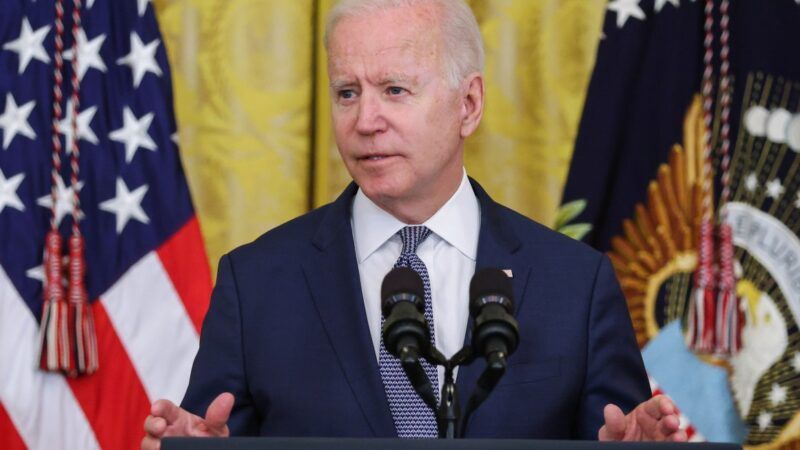After Claiming It Didn't Have the Power To Impose A New Eviction Moratorium, the Biden Administration Imposes a New Eviction Moratorium
The new eviction moratorium applies to the 90 percent of counties in the U.S. where the spread of COVID-19 is "substantial" or "high."

After three days of finger-pointing between a Democrat-controlled White House and a Democrat-controlled Congress, President Joe Biden's Administration has now revived an eviction moratorium it previously said it has no legal authority to impose.
An order issued by the Centers for Disease Control and Protection (CDC) Tuesday evening generally bans the eviction of non-paying tenants in counties identified by the CDC as having "substantial" or "high" rates of COVID-19 transmission. About 90 percent of the counties in the country, per the CDC order, meet that definition.
"The emergence of the delta variant has led to a rapid acceleration of community transmission in the United States, putting more Americans at increased risk, especially if they are unvaccinated," said CDC Director Rochelle Walensky. "This moratorium is the right thing to do to keep people in their homes and out of congregate settings where COVID-19 spreads."
The new order covers any renter making up to $99,000 ($198,000 per couple) and who signs a hardship declaration stating that they have lost income, have tried to access government assistance, and would likely be made homeless or forced to move into a more crowded living situation.
This is little changed from the CDC's last eviction moratorium, which was first issued by the Trump administration in September 2020, and has since been extended multiple times.
On June 24, the CDC pushed back its eviction order's expiration date, which at the time was set at June 30, out to July 31. In a statement, the agency said that "this is intended to be the final extension of the moratorium." A few days later, the U.S. Supreme Court declined to take up an emergency petition from a group of Alabama realtors to hear their challenge to the CDC's order, effectively allowing the moratorium to stay in place.
Justice Brett Kavanaugh, one of five justices who essentially voted to keep the moratorium in place, issued a short opinion saying that he thought the CDC's order was illegal. Nevertheless, he said that it should be allowed to run its course given that it would expire in a few weeks anyway, and that those weeks would give more time for $46 billion in rental assistance funds to trickle out to tenants and landlords.
At the same, Kavanaugh wrote that "clear and specific congressional authorization (via new legislation) would be necessary for the CDC to extend the moratorium past July 31."
Because of that opinion, the Biden administration has been telling anyone who'll listen that it couldn't extend the moratorium on its own.
"To date, CDC Director Rochelle Walensky and her team have been unable to find legal authority for a new, targeted eviction moratorium," White House Press Secretary Jen Psaki said in a statement Monday
"The President has not only kicked the tires; he has double, triple, quadruple checked. He has asked the CDC to look at whether you could even do targeted eviction moratorium—that just went to the counties that have higher rates—and they, as well, have been unable to find the legal authority for even new, targeted eviction moratoriums," said White House advisor Gene Sperling at a press conference the same day.
That did little to mollify House Democrats who, instead of using their lawmaking powers to pass a more legally robust eviction moratorium, have been haranguing the Biden administration to extend its order.
One day after the moratorium expired, House Speaker Nancy Pelosi (D–Calif.) and other members of the Democratic leadership said that legislation extending the moratorium would never make it out of the Senate and therefore it was the White House's "moral imperative" to extend the order on its own. Rep. Cori Bush (D–Mo.) had even taken to sleeping on the Capitol steps in an effort to pressure the White House to extend its moratorium.
In the end, the pressure campaign worked.
Since it was first imposed, the CDC's eviction order has proven legally controversial. Some six federal courts have ruled against the moratorium, including the Sixth Circuit Court of Appeals two weeks ago. Three other federal courts have upheld the moratorium.
The CDC has consistently argued that its eviction moratorium is justified by public health laws and related regulations giving it the power to take actions "reasonably necessary" to prevent the spread of communicable disease. Property owners have argued in numerous lawsuits that the agency is illegally claiming for itself near-limitless power to issue whatever regulations it wants.
"The new moratorium is an only slightly scaled-down version of the old. As such, it has virtually all the same flaws and legal vulnerabilities," wrote George Mason University law professor Ilya Somin earlier today at the Volokh Conspiracy (which is hosted by Reason). "The new version still must rely on a legal rationale giving the CDC virtually unlimited power to shut down any activity that might potentially facilitate the spread of disease in any way."
The new moratorium is supposed to last until October 3. Given that it's now been extended five times, there's no reason to assume that the White House is committed to sticking to that date.
The moratorium's extension gives the Supreme Court another opportunity to rule on the extent of the CDC's powers to ban evictions in the entire country.
